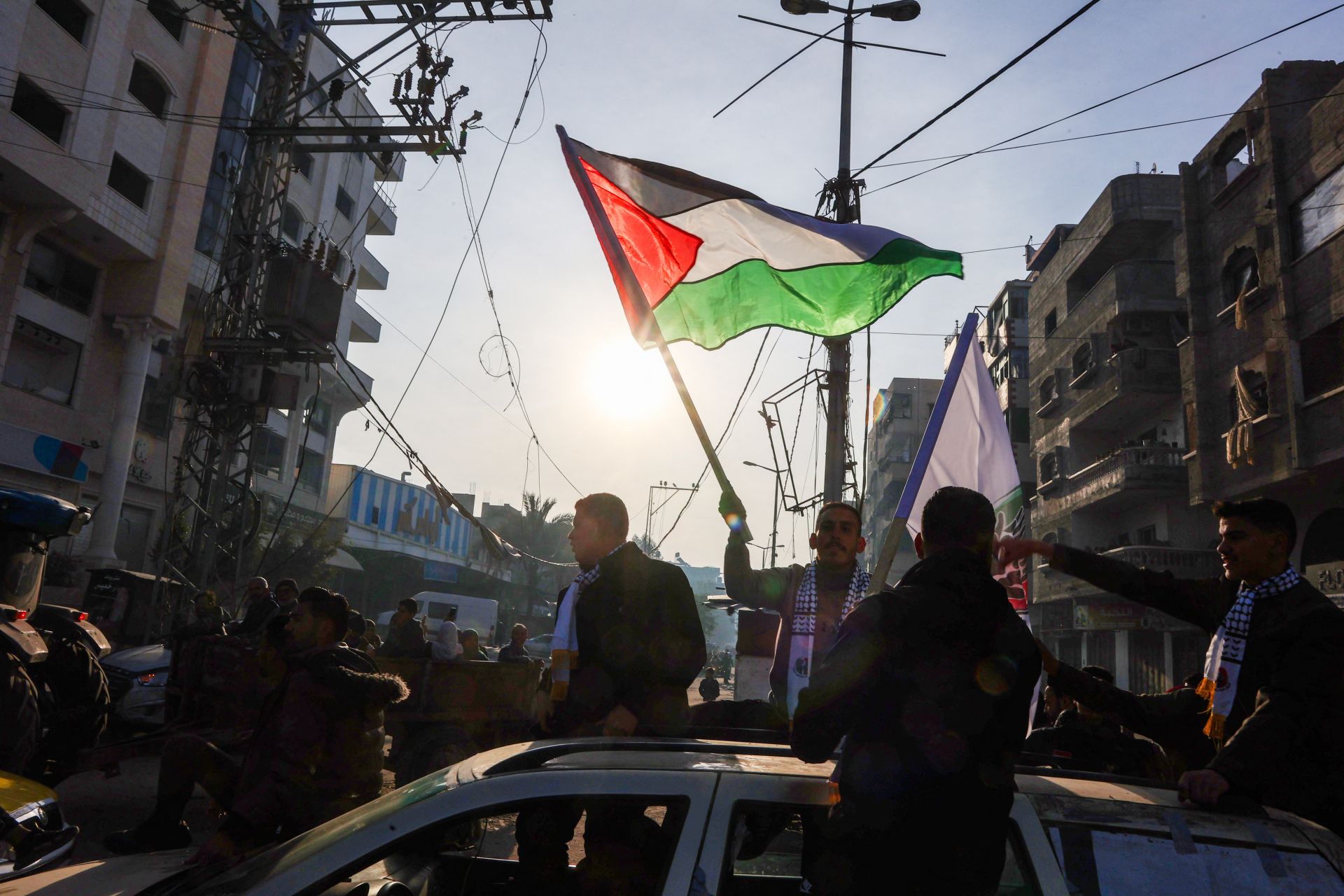- Home
- Middle East
- Gaza Truce Takes Effect with Nearly a Three-Hour Delay

A man waves a Palestinian flag as people celebrate the ceasefire deal in the Israel-Hamas war in Gaza City on January 19, 2025.
After 15 months of war in the Gaza Strip, Israel announced on Sunday the implementation of a ceasefire with Hamas, delayed by nearly three hours due to Hamas publishing the names of hostages scheduled for release that day.
The Qatari mediator also confirmed on Sunday the enforcement of the ceasefire in Gaza, noting that the names of the three Israeli hostages held by Hamas, who are to be released during the day, had been communicated to Israel.
"We confirm that the names of the three hostages to be released today have been transmitted to the Israeli side. They are three Israeli women, one of whom also holds Romanian citizenship and another British citizenship. Thus, the ceasefire has begun," said the spokesperson for the Qatari Ministry of Foreign Affairs, Majed Al-Ansari, in a statement.
As the ceasefire was delayed, Gaza's Civil Defense announced on Sunday morning 8 dead and 25 wounded in Israeli air strikes. According to medical sources in Gaza, the death toll has risen to 19, with 36 injured.
This implementation, on the eve of Donald Trump's return to the White House, of the agreement reached on Wednesday raises hopes for lasting peace in the Palestinian territory, although Israel has already reserved the right to resume hostilities if necessary.
Under the agreement, hostilities were supposed to cease at 06:30 GMT, but citing delays caused by Hamas in identifying the first group of hostages to be released during the day, Israel conducted further strikes in Gaza on Sunday, resulting in eight deaths according to local civil defense sources.
Hamas later announced it had provided the names of the three Israeli women set to be freed during the day, and the office of Israeli Prime Minister Benjamin Netanyahu subsequently confirmed the ceasefire had come into effect at 09:15 GMT.
Hamas justified the delay by citing "field complications and continued bombings."
Early in the morning, many Palestinians in Gaza took to the streets to celebrate the truce, seemingly unaware of the delay, with some displaced residents already preparing to return to their homes.
"We spent the night gathering our belongings and were on our way back home when we heard the sound of bombings," said Mohammad Baraka, a displaced resident in southern Gaza, before the ceasefire officially began.
'War needed to end'
Even ahead of the truce, Gazans displaced by the war to other parts of the devastated territory were preparing to return home.
"I will go to kiss my land," said Nasr al-Gharabli, who fled his home in Gaza City for a camp farther south. "If I die on my land, it would be better than being here as a displaced person."
The Israeli army warned Gaza residents early Sunday not to approach its forces or Israeli territory.
"We urge you not to head towards the buffer zone or IDF forces for your safety," military spokesman Avichay Adraee said on Telegram. "At this stage, heading towards the buffer zone or moving from south to north via Gaza Valley puts you at risk. Anyone heading towards these areas endangers themselves."
Jerusalem residents said the deal had been a long time coming.
"Hopefully a maximum amount of hostages will be coming back," said Beeri Yemeni, a university student.
"Maybe this is the beginning of (the) end of suffering for both sides, hopefully," he said, adding that "the war needed to end like a long, long time ago".
Long ordeal
Israel has prepared reception centers to provide medical treatment and counselling to the freed hostages before they return to their families after their long ordeal.
Israel's justice ministry had previously said 737 Palestinian prisoners and detainees would be freed during the deal's first phase, starting from 4:00 pm (1400 GMT) on Sunday.
Two sources close to Hamas told AFP that the first group of hostages to be released would be three Israeli women soldiers.
However, as the militant group describes any Israeli of military age who has completed mandatory military service as a soldier, the women could be civilians abducted during the October 7 attack.
Hundreds of aid trucks were waiting at the Gaza border, poised to enter from Egypt as soon as they get the all-clear to deliver desperately needed aid to the Palestinian territory.
Egyptian Foreign Minister Badr Abdelatty said 600 trucks a day would enter Gaza after the ceasefire takes effect, including 50 carrying fuel.
Through the war, there has been only one previous truce, for one week in November 2023.
That deal also saw the release of hostages held by the militants in exchange for Palestinian prisoners.
Trump
Hamas's October 7 attack on Israel resulted in the deaths of 1,210 people, mostly civilians, according to an AFP tally of Israeli official figures.
Of the 251 people taken hostage, 94 are still in Gaza, including 34 the Israeli military says are dead.
Israel's retaliatory campaign has destroyed much of Gaza, killing 46,899 people, most of them civilians, according to figures from the Hamas-run territory's health ministry that the United Nations considers reliable.
The truce is to take effect on the eve of Trump's inauguration for a second term as President of the United States.
Trump, who claimed credit for the ceasefire deal, told US network NBC on Saturday that he had told Netanyahu that the war "has to end".
"We want it to end, but to keep doing what has to be done," he said.
Brett McGurk, the pointman for outgoing President Joe Biden, was joined in the region by Trump envoy Steve Witkoff in an unusual pairing to finalize the agreement, US officials said.
Under the deal, Israeli forces will withdraw from densely populated areas of Gaza and allow displaced Palestinians to return "to their residences", the Qatari prime minister said.
Biden said an unfinished second phase of the agreement would bring a "permanent end to the war".
In aid-starved Gaza, relief agencies caution a monumental task lies ahead.
With Jay DESHMUKH / AFP
Read more



Comments